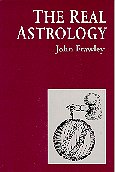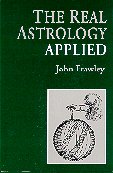![]()


Book Review: The Real Astrology and The Real Astrology Applied by John Frawley
by Dorian Gieseler Greenbaum © 2002
Last year, without much fanfare, one of the most provocative and compelling astrology books to appear in recent years was published. The Real Astrology is John Frawley's irreverent, intelligent and incisive skewering of much of what is wrong with modern astrology, coupled with an introduction to the tools of traditional astrology. Frawley is a traditional astrologer who bases much of his practice of astrology on William Lilly, but who has more than a passing acquaintance with other great names from astrology's past: Ptolemy, Abu Ali Al-Khayyat, Al Biruni and Bonatti among them.
Frawley is passionate about his subject, which is one of the reasons his book is so hard to put down. He is also an excellent writer who has a mordant wit which he uses to great effect (and some of his comments are just laugh-out-loud funny). You may not agree with everything he says, but there is no arguing with how well he says it. At times his impalement of many of the practices of modern astrology borders on the cruel – but as they say, "the truth hurts." He takes well-aimed jabs at such modern abominations as the sun-sign column. He also makes what I imagine will be less popular attacks on the darlings of the humanistic and psychological/Jungian astrology movements, Dane Rudhyar and Liz Greene (he calls Rudhyar's work "intellectual blancmange," while describing Greene's work as falling "between two stools, being scorned by both psychologists and those with a working knowledge of sound astrology…."). This is strong stuff, but it certainly does make for an interesting read!
As entertaining as these ambushes are, they actually disguise the true value of The Real Astrology. This lies in Frawley's brilliant, and at times poetic, discussion of the philosophical and sacred foundation of astrology. Frawley is well aware of the divine component of astrological knowledge, and he is not afraid to mention God when he talks about it: "…implicit in its [astrology's] teachings is the truth that all power is with God, and all things are subject to His will." Our secular age has lost this connection to the divine, and that is why astrology struggles in modern culture; as Frawley says, "Astrology is a sacred science – take away the sacred and we have nothing."
Continuing on, he tackles the nature of time (real and clock time), the order of the cosmos, and makes an analysis of essence and matter that is in my opinion worth the price of the book. "In the heart of each object is its essence; all around it is its accidental form. The classic image of essence is as the Idea in the mind of the Divine Architect, the accidental form of which Idea appears to us as an object in the world. … Without recognising the existence of essence, we are left only with the material…. Left only with the material, we cannot possibly provide a convincing explanation for the workings of astrology." Frawley follows his philosophical discussion with a practical introduction on how essence works in astrology.
I do not agree with everything Frawley says (for instance, his rejection of the day-night differentiations of the Parts of Fortune and Spirit and those which derive from them; and I also have some minor technical quibbles with him), but on the whole I believe his work to be immensely important reading for any astrologer interested in the philosophy behind the concepts we take for granted, or ignore, in our art.
Frawley has followed up The Real Astrology with a sequel, The Real Astrology Applied, which was published this summer. It consists of a series of essays mostly published in his journal, The Astrologer's Apprentice (though revised for the book), and is designed to further explore the practical application of the ideas introduced in The Real Astrology. Again, with his biting sense of humor and ability to cut to the heart of the matter, Frawley writes about Arabian parts, antiscia, dignity and reception, the Moon and fixed stars, and a long (about 60 pages) exposition on the houses. For the philosophy junkies (I include myself), there is a wonderful essay called "The Internal King," which again explores astrology's relationship to the divine, soul and matter. There is also a section on assessing temperament, which refines and improves what he said about temperament in The Real Astrology, and also gives a critique of Lilly's method for determining temperament. I have made a special study of temperament myself, and completely agree with Frawley that it is a most important component in analyzing a chart.
Interspersed with the essays is Frawley's humorous take on advice columns, "Neptunia Replies…a word from our sensitive seer." These letters and responses provide an easy opportunity for Frawley to skewer the mushiness of much modern astrology (and usually hilariously), but they also give him the means to explore certain aspects of traditional astrology and philosophy.
Perhaps Frawley's style is not for everyone (though at the very least I find it quite entertaining!), and perhaps you will also disagree with what he says, but both The Real Astrology and The Real Astrology Applied are books with original and creative ideas, and worlds away from much of the astrological pap that is published today. John Frawley's is an invigorating voice in astrology today, and his books are well worth your investigation.

If this review piqued your interest in Frawley’s
books, you can link here to his site: http://www.johnfrawley.com
